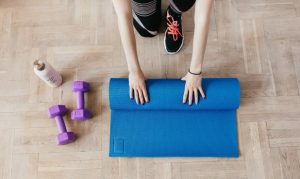
Regular exercise is one of the best things you can do for your health and fitness. Not only does exercise help you maintain a healthy weight, but it also has numerous physical and mental health benefits. In this article, we’ll explore the top benefits of regular exercise and provide tips on how to get started.
1- Physical Benefits of Exercise

Exercise offers a wide range of physical benefits that contribute to overall health, well-being, and longevity. Regular physical activity plays a crucial role in maintaining a healthy body and preventing various chronic diseases. Here are some of the significant physical benefits of exercise:
- Improved Cardiovascular Health: Regular exercise strengthens the heart and cardiovascular system. It helps lower blood pressure, reduce LDL cholesterol (the “bad” cholesterol), and increase HDL cholesterol (the “good” cholesterol). These effects lower the risk of heart disease, stroke, and other cardiovascular conditions.
- Weight Management: Exercise plays a key role in weight management by burning calories and increasing metabolism. Combining exercise with a balanced diet can help individuals achieve and maintain a healthy weight, reducing the risk of obesity-related health issues.
- Enhanced Muscle Strength and Endurance: Exercise, particularly strength training and resistance exercises, helps build muscle mass and increases muscle strength and endurance. Strong muscles support joint health, improve posture, and enhance overall physical performance.
- Bone Health: Weight-bearing exercises, such as walking, running, and strength training, are beneficial for bone health. Regular physical activity helps maintain bone density, reducing the risk of osteoporosis and fractures, especially in older adults.
- Improved Flexibility and Balance: Activities like yoga and stretching exercises can improve flexibility and balance, reducing the risk of falls and injuries, particularly in older individuals.
- Enhanced Immune System: Regular moderate-intensity exercise has been linked to improved immune function. It helps the body produce more antibodies and white blood cells, which are essential for fighting off infections and illnesses.
- Better Respiratory Function: Exercise improves lung capacity and respiratory efficiency, promoting better oxygen exchange and overall respiratory health.
- Regulation of Blood Sugar Levels: Physical activity aids in insulin sensitivity, which helps regulate blood sugar levels. For individuals with diabetes or at risk of developing type 2 diabetes, exercise can be an important part of managing the condition.
- Increased Energy and Stamina: Engaging in regular physical activity boosts energy levels and endurance. Over time, individuals often find they can perform daily tasks with less fatigue and increased stamina.
- Enhanced Mood and Mental Health: The physical benefits of exercise extend to mental health as well. Physical activity triggers the release of endorphins, leading to improved mood, reduced stress, and anxiety relief.
- Reduced Risk of Chronic Diseases: Regular exercise is associated with a lower risk of developing chronic conditions, such as type 2 diabetes, certain types of cancer (e.g., colon and breast cancer), and metabolic syndrome.
- Improved Sleep Quality: Exercise can contribute to better sleep quality, helping individuals fall asleep faster and enjoy more restful sleep.
- Lower Risk of Hypertension: Regular physical activity can help prevent and manage hypertension (high blood pressure), a significant risk factor for heart disease and stroke.
- Enhanced Brain Health: Exercise has been linked to improved cognitive function and reduced risk of cognitive decline and neurodegenerative diseases in later life.
- Increased Longevity: Leading an active lifestyle and engaging in regular exercise have been associated with increased life expectancy and a higher quality of life in older age.
To maximize the physical benefits of exercise, it’s essential to find activities that you enjoy and can sustain over time. Whether it’s walking, cycling, swimming, dancing, or any other form of physical activity, incorporating regular exercise into your routine is a powerful investment in your health and well-being. As with any lifestyle change, it’s a good idea to consult with a healthcare professional before starting a new exercise program, especially if you have any existing health conditions or concerns.
2- Mental Health Benefits of Exercise

Regular physical activity is not only vital for our physical well-being but also plays a crucial role in promoting mental health and overall psychological well-being. The connection between exercise and mental health is well-established, with numerous studies highlighting the positive impact of physical activity on various aspects of mental well-being. Let’s explore some of the significant mental health benefits of exercise in more detail:
1- Reduced Stress and Anxiety:
One of the most well-known mental health benefits of exercise is its ability to reduce stress and anxiety levels. When you engage in physical activity, your body releases endorphins, commonly known as “feel-good” chemicals, which act as natural stress relievers. These endorphins interact with receptors in the brain that reduce the perception of pain and trigger positive feelings, leading to a sense of well-being and calmness.
Activities such as yoga or tai chi, which incorporate elements of mindfulness and deep breathing, have been particularly effective in reducing stress and promoting relaxation. The meditative aspect of these practices encourages individuals to be present in the moment, reducing anxious thoughts and worries about the future.
2- Improved Mood and Self-esteem:
Exercise has a profound impact on mood regulation and self-esteem. Physical activity triggers the release of various neurotransmitters, including serotonin, dopamine, and norepinephrine, which are responsible for enhancing mood and promoting feelings of happiness and contentment. These mood-boosting chemicals play a significant role in managing mood disorders, such as depression and anxiety.
Furthermore, engaging in regular exercise and achieving fitness goals can significantly improve self-esteem and body image. As individuals experience progress and witness positive changes in their physical abilities, they develop a greater sense of self-confidence and self-worth.
3- Increased Brain Function and Memory:
Regular exercise has been shown to improve cognitive function and memory. Physical activity increases blood flow to the brain, delivering essential nutrients and oxygen necessary for optimal brain function. Additionally, exercise promotes the production of brain-derived neurotrophic factor (BDNF), a protein that supports the growth and maintenance of brain cells, enhancing neuroplasticity and overall brain health.
To maximize the cognitive benefits of exercise, consider incorporating activities that challenge your brain. Crossword puzzles, brain teasers, and learning a new language are excellent choices to stimulate your cognitive abilities and memory.
4- Enhanced Sleep Quality and Regulation:
Another often overlooked but significant mental health benefit of exercise is its positive impact on sleep quality and regulation. Regular physical activity helps regulate the body’s internal clock, known as the circadian rhythm, which influences sleep-wake cycles. By promoting a more consistent sleep schedule, exercise can help combat insomnia and improve overall sleep quality.
However, it’s essential to find the right balance, as intense exercise close to bedtime may temporarily increase alertness and make falling asleep challenging. Incorporate calming activities like gentle stretches or meditation in the evening to prepare your mind and body for a restful night’s sleep.
5- Stress Resilience and Coping Skills:
Engaging in regular exercise not only reduces existing stress levels but also enhances stress resilience and coping skills. Physical activity serves as a form of controlled stress for the body, prompting it to adapt and become more resilient over time. This adaptation process translates into improved coping mechanisms, making individuals better equipped to handle life’s challenges and reducing the negative impact of stress on their mental health.
To harness the stress-resilience benefits of exercise, consider setting and achieving fitness goals. The sense of accomplishment and progress can boost your self-confidence and belief in your abilities to tackle other aspects of life successfully.
6- Social Connection and Support:
Participating in group exercises or team sports can provide valuable opportunities for social connection and support, which are essential for maintaining good mental health. Social interactions foster a sense of belonging, reduce feelings of isolation, and provide emotional support during difficult times.
Consider joining a fitness class, sports club, or recreational group that aligns with your interests and preferences. Engaging with like-minded individuals can create a positive and uplifting environment, promoting feelings of camaraderie and friendship.
7- Stress Reduction through Mind-Body Exercises:
Mind-body exercises like yoga and tai chi, as mentioned earlier, not only reduce stress but also promote mindfulness and relaxation. These practices combine physical movements with focused breathing and meditation, leading to a harmonious connection between the mind and body.
By regularly practicing mind-body exercises, you can learn to be more present and attentive to your thoughts and feelings. This increased self-awareness can help you identify stress triggers and respond to them in a more composed and balanced manner.
8- Alleviation of Depression Symptoms:
Exercise has been recognized as an effective complement to traditional therapies for individuals dealing with depression. Physical activity stimulates the release of endorphins and other neurotransmitters that enhance mood and alleviate depressive symptoms.
If you’re struggling with depression, consult with a healthcare professional to develop an exercise plan tailored to your needs and abilities. Incorporate a variety of activities that you enjoy and that align with your energy levels, such as brisk walking, cycling, dancing, or swimming.
9- Enhanced Cognitive Function and Creativity:
Regular physical activity not only improves memory and brain function but also boosts creativity and cognitive flexibility. Exercise stimulates the production of brain-derived neurotrophic factor (BDNF), a protein that supports the growth and maintenance of neurons and their connections, promoting overall brain health.
To enhance cognitive benefits, engage in a diverse range of exercises and activities that challenge your brain in different ways. Puzzle-solving, creative hobbies, and activities that require coordination and multitasking can all contribute to keeping your mind sharp and imaginative.
10- Boosted Resilience and Empowerment:
Regular exercise instills a sense of resilience and empowerment by encouraging individuals to take control of their health and well-being. As they make progress in their fitness journey, individuals develop a belief in their ability to overcome obstacles and face life’s challenges with determination.
Moreover, exercise can serve as a healthy outlet for managing emotions and frustrations. Physical activity provides a constructive way to release pent-up energy and reduce feelings of tension or anger, contributing to better emotional regulation.
11- Enhanced Executive Function and Focus:
Executive functions are cognitive processes responsible for tasks such as decision-making, problem-solving, and goal-setting. Exercise has been found to enhance executive function and focus, enabling individuals to approach tasks more efficiently and stay on track.
Engaging in activities that require concentration and focus, such as dance classes or martial arts, can further boost executive function and improve the ability to stay present and attentive in various aspects of life.
12- Long-Term Protection against Cognitive Decline:
Regular exercise has shown promising effects in protecting against cognitive decline and reducing the risk of age-related neurodegenerative diseases, such as Alzheimer’s disease. By promoting brain health and neuroplasticity, exercise can contribute to maintaining cognitive function and preserving memory as individuals age.
3- Exercise and Sleep

Sleep is a fundamental aspect of overall health and well-being, and the relationship between exercise and sleep is a powerful and intricate one. Numerous studies have highlighted the significant impact that regular physical activity can have on sleep quality, duration, and overall sleep-related outcomes. Let’s delve into the various aspects of this connection and explore how exercise can promote better sleep:
1- Improved Sleep Quality:
Engaging in regular physical activity has been shown to lead to improved sleep quality. When we exercise, our body temperature rises, and as it cools down post-workout, it signals the brain that it’s time to sleep. This cooling process aligns with the body’s natural circadian rhythm, promoting a smoother transition into sleep.
Moreover, exercise helps reduce stress and anxiety, which are common culprits for disrupted sleep patterns. By releasing endorphins and other mood-regulating neurotransmitters, exercise acts as a natural stress reliever, helping to calm the mind and prepare it for restorative sleep.
2- Regulation of Sleep-Wake Cycles:
Consistent exercise can help regulate the body’s internal clock, known as the circadian rhythm, which governs our sleep-wake cycles. Regular physical activity, especially if done at the same time each day, reinforces the body’s sleep-wake pattern, making it easier to fall asleep at night and wake up refreshed in the morning.
However, it’s important to note that the timing of exercise can play a role in its effects on sleep. Intense workouts close to bedtime might temporarily increase alertness and make it more challenging to fall asleep. On the other hand, engaging in calming activities, such as yoga or light stretching, in the evening can aid in relaxation and prepare the body for sleep.
3- Sleep Duration and Efficiency:
Regular exercise has been associated with longer and more efficient sleep. People who engage in physical activity tend to experience a greater proportion of deep sleep, also known as slow-wave sleep, which is crucial for physical restoration and cognitive functioning.
Additionally, exercise can help reduce the frequency of nighttime awakenings, allowing for more uninterrupted and restful sleep. As a result, individuals who exercise regularly often report feeling more refreshed and alert during the day, thanks to the restorative benefits of improved sleep.
4- Combating Insomnia:
Insomnia, characterized by difficulty falling asleep or staying asleep, can significantly impact an individual’s well-being. Exercise has been recognized as a non-pharmacological approach to combating insomnia and improving sleep quality.
Incorporating moderate aerobic exercises, such as walking or cycling, into daily routines can help alleviate symptoms of insomnia. Studies have shown that individuals with insomnia who engaged in regular exercise experienced reduced sleep onset latency (the time it takes to fall asleep) and improved sleep efficiency.
5- Mental Health and Sleep:
The connection between exercise, mental health, and sleep is multifaceted. Poor sleep can exacerbate mental health issues, such as anxiety and depression, while regular exercise can positively impact both sleep and mental well-being.
As mentioned earlier, exercise helps reduce stress and anxiety, which are common contributors to sleep disturbances. By promoting better mental health, exercise indirectly supports healthy sleep patterns and contributes to an overall sense of well-being.
6- Sleep and Athletic Performance:
For athletes and physically active individuals, sleep plays a crucial role in performance and recovery. Inadequate sleep can lead to decreased physical and cognitive performance, impair decision-making abilities, and prolong post-exercise recovery.
On the other hand, athletes who prioritize sleep as part of their training regimen experience enhanced athletic performance and reduced risk of injuries. Sleep is when the body repairs and rebuilds tissues, strengthens the immune system, and consolidates memories, all of which are vital for athletic success.
7- Creating a Sleep-Friendly Exercise Routine:
To optimize the benefits of exercise on sleep, consider the following tips:
a) Find the Right Time: Pay attention to how your body responds to exercise at different times of the day. Some people find morning workouts invigorating, while others prefer late afternoon or early evening sessions. Choose a time that suits your energy levels and won’t interfere with your ability to wind down before bedtime.
b) Consistency is Key: Establishing a consistent exercise routine is crucial for regulating your body’s sleep-wake cycle. Aim for at least 150 minutes of moderate-intensity exercise or 75 minutes of vigorous-intensity exercise per week, spread across several days.
c) Balance Intensity: While exercise can improve sleep, intense workouts close to bedtime might lead to heightened arousal and difficulty falling asleep. Incorporate relaxation exercises, like yoga or meditation, into your evening routine to promote a more peaceful transition into sleep.
d) Listen to Your Body: Be mindful of how your body responds to exercise. If you experience pain or discomfort, it’s essential to address these issues to avoid sleep disruptions.
e) Create a Sleep-Conducive Environment: Alongside regular exercise, create a sleep-conducive bedroom environment. Keep the room cool, dark, and quiet, and establish a relaxing bedtime routine to signal your body that it’s time to wind down.
4- How to Get Started with Exercise

Getting started with exercise can be both exciting and intimidating, especially if you’re new to it or returning after a break. However, taking that first step is crucial for improving your physical fitness, mental well-being, and overall health. Here are some practical steps to help you get started with exercise:
1- Consult with a Healthcare Professional:
Before beginning any exercise program, it’s essential to consult with a healthcare professional, especially if you have any pre-existing medical conditions or concerns. A doctor or fitness expert can assess your health status, provide personalized recommendations, and help you determine the best type and intensity of exercise for your needs and goals.
2- Set Clear and Realistic Goals:
Define your exercise goals to give yourself a clear sense of purpose and motivation. Whether your objectives are related to weight loss, improved cardiovascular health, increased flexibility, or stress reduction, setting specific and achievable goals will help you stay focused and track your progress.
3- Start Slowly and Gradually Increase Intensity:
If you’re new to exercise or have been inactive for a while, it’s essential to start slowly to avoid injury and burnout. Begin with low-impact activities that match your fitness levels, such as walking, swimming, or cycling. Gradually increase the duration and intensity of your workouts as your body adapts and becomes stronger.
4- Choose Activities You Enjoy:
Engaging in activities you genuinely enjoy will make the process of getting started with exercise more enjoyable and sustainable. Consider trying out various forms of exercise, such as dancing, hiking, team sports, or yoga, to find what sparks your interest and keeps you motivated to stay active.
5- Find an Exercise Buddy or Join a Group:
Exercising with a friend, or family member, or joining a fitness group can be a great way to stay motivated and make the experience more enjoyable. Having a workout buddy can provide accountability and encouragement, and group classes often offer a supportive and fun environment.
6- Create a Realistic Schedule:
Consistency is key to seeing progress with exercise. Create a realistic exercise schedule that fits into your daily routine and commitments. Even short bursts of activity, such as a 15-minute walk during lunch breaks, can add up and make a positive impact on your fitness journey.
7- Warm-up and Cool Down:
Before starting any exercise session, it’s essential to warm up your muscles to prevent injuries. Engage in dynamic stretches or light aerobic movements to increase blood flow and prepare your body for the workout. After exercise, cool down with static stretches to promote flexibility and aid in recovery.
8- Listen to Your Body:
Pay attention to your body’s signals and avoid pushing yourself too hard, especially in the beginning. It’s normal to feel some muscle soreness after starting a new exercise routine, but severe pain or discomfort may indicate that you’re overdoing it. Allow for adequate rest and recovery between workouts to prevent overtraining.
9- Set Small Milestones and Celebrate Progress:
Celebrate your achievements, no matter how small they may seem. Setting incremental milestones and acknowledging your progress can help you stay motivated and build confidence in your abilities.
10- Track Your Progress:
Keep track of your workouts and improvements to see how far you’ve come. Whether you use a fitness app, a journal, or a simple calendar, tracking your exercise sessions and results can be a powerful tool for maintaining motivation and identifying areas for growth.
11- Stay Hydrated and Maintain a Balanced Diet:
Proper hydration and nutrition are essential for supporting your exercise routine and overall health. Drink plenty of water before, during, and after exercise, and fuel your body with a balanced diet rich in fruits, vegetables, whole grains, and lean proteins.
Remember that everyone’s fitness journey is unique, and it’s okay to progress at your own pace. The most important thing is to stay consistent and committed to making exercise a regular part of your lifestyle. As you build strength, endurance, and confidence, you’ll likely find that exercise becomes a rewarding and enjoyable habit that positively impacts many aspects of your life.
Conclusion

In conclusion, exercise is a powerful and multifaceted tool that offers numerous benefits for both physical and mental well-being. From cardiovascular health and weight management to improved mood and cognitive function, regular physical activity positively impacts various aspects of our lives.
Engaging in exercise contributes to better cardiovascular health, reducing the risk of heart disease, stroke, and other related conditions. It aids in weight management, supporting individuals in achieving and maintaining healthy body weight and reducing the risk of obesity-related health issues.
Exercise enhances muscle strength and endurance, leading to better physical performance and supporting joint health. It also promotes bone density, reducing the risk of osteoporosis and fractures, particularly in older adults.
Beyond the physical benefits, exercise plays a crucial role in mental health. It reduces stress and anxiety, enhances mood, and contributes to better sleep quality. Exercise can be a valuable tool in managing conditions such as depression and anxiety, improving overall psychological well-being.
Moreover, leading an active lifestyle can reduce the risk of chronic diseases, such as type 2 diabetes and certain types of cancer, and contribute to increased longevity and a higher quality of life in later years.
To make the most of the benefits of exercise, it’s important to find activities that you enjoy and can incorporate into your daily routine. Setting realistic goals and being consistent in your efforts will yield long-term rewards for your health and overall quality of life.
In our fast-paced and often sedentary modern lifestyles, taking the time to prioritize regular physical activity is an investment in our well-being that pays dividends both in the present and for the future. Whether it’s walking in nature, practicing yoga, engaging in team sports, or hitting the gym, finding joy in movement is key to maintaining a healthy and balanced life.
Remember, before starting any new exercise program, it’s wise to consult with a healthcare professional, especially if you have any underlying health conditions or concerns. With the right guidance and commitment, exercise can become a lifelong companion on your journey to a healthier, happier, and more fulfilling life.



